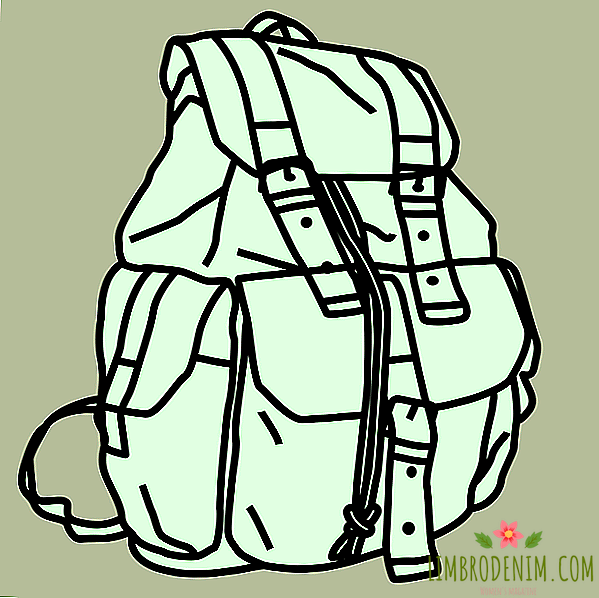"Everybody thinks I'm flirting": Girls about cold allergies
Life in latitudes where it is cold for at least six months, requires special endurance - and if there are no problems with central heating and adequate clothing these days, the skin is not all cold tolerant. We asked several heroines with hypersensitivity to cold about how it manifests itself, and asked immunologists to explain whether there really is a cold allergy and what can be done with it.

 This problem appeared in school: eyes began to get very watery on the street. At first I thought it was due to the wind, but then I realized that I was reacting to the cold. As a result, she stopped using mascara for the eyelashes - first in winter, in early spring and late autumn, and then in the rest of the time. However, it is impossible to refuse eyeliner - and this is practically the only cosmetic product, except for foundation and blush, which I use. I learned to gently "cry" and always carry with me paper handkerchiefs and a mirror to control the situation. There are no painful sensations, the only discomfort is uncontrollable streams of tears, which are very unpleasant to wipe in the cold; if the wipes are not at hand, wool mittens strongly scratch wet skin.
This problem appeared in school: eyes began to get very watery on the street. At first I thought it was due to the wind, but then I realized that I was reacting to the cold. As a result, she stopped using mascara for the eyelashes - first in winter, in early spring and late autumn, and then in the rest of the time. However, it is impossible to refuse eyeliner - and this is practically the only cosmetic product, except for foundation and blush, which I use. I learned to gently "cry" and always carry with me paper handkerchiefs and a mirror to control the situation. There are no painful sensations, the only discomfort is uncontrollable streams of tears, which are very unpleasant to wipe in the cold; if the wipes are not at hand, wool mittens strongly scratch wet skin.
I didn’t go to a doctor - I just got used to it, and besides I don’t feel pain or much discomfort. I do not like the cold, always very cold, but it was never a reason to leave. Frost is, of course, unpleasant, but very beautiful.
 It all started a couple of years ago in the fall. It was not very cold, but it was windy and damp, it was raining, I was carrying an umbrella, and the tips of my fingers suddenly began to itch very much, swollen and reddened. Everything went when I went into a warm room and warmed up. Since then it happens so often: the tips of the fingers on the hands and feet swell, and sometimes the ears swell. One day last winter, my cheekbones swelled from the cold and my eyes swam - I entered the subway, looked at myself in the mirror and was horrified.
It all started a couple of years ago in the fall. It was not very cold, but it was windy and damp, it was raining, I was carrying an umbrella, and the tips of my fingers suddenly began to itch very much, swollen and reddened. Everything went when I went into a warm room and warmed up. Since then it happens so often: the tips of the fingers on the hands and feet swell, and sometimes the ears swell. One day last winter, my cheekbones swelled from the cold and my eyes swam - I entered the subway, looked at myself in the mirror and was horrified.
I tried to drink antihistamines in the morning - then the allergy did not manifest itself, but I did not feel like drinking pills seven or eight months a year. I am not going anywhere from Moscow during the cold period, since childhood I got used to all sorts of allergies, so I’m not very afraid of them - but this is certainly very uncomfortable.
 In contact with the cold, my skin reacts - though not always, but I cannot reveal the exact pattern; a red rash appears, elbows, knees and lips dry, and in the worst case the general state of health worsens. At fifteen, I went to the doctor, he said, what is the name of this phenomenon (I do not remember now), and advised me to take vitamin D and go to the solarium. Since then we all thought that the tanning bed was our friend, I periodically sunbathed, but without fanaticism. Intolerance manifests itself at any time of the year - for example, in summer it comes from cold water. In winter, I strive to go to the heat, but not because of allergies, but simply because it is more pleasant to live. Worst of all was just in the summer, when the hot water was turned off, - the issue was solved by hiring a housekeeper.
In contact with the cold, my skin reacts - though not always, but I cannot reveal the exact pattern; a red rash appears, elbows, knees and lips dry, and in the worst case the general state of health worsens. At fifteen, I went to the doctor, he said, what is the name of this phenomenon (I do not remember now), and advised me to take vitamin D and go to the solarium. Since then we all thought that the tanning bed was our friend, I periodically sunbathed, but without fanaticism. Intolerance manifests itself at any time of the year - for example, in summer it comes from cold water. In winter, I strive to go to the heat, but not because of allergies, but simply because it is more pleasant to live. Worst of all was just in the summer, when the hot water was turned off, - the issue was solved by hiring a housekeeper.
It is unpleasant that when you tell people about a cold allergy, most decide that you are either flirting or just lying.
 I began to feel sensitivity to cold ten years ago and is mainly manifested by dry skin, redness, scaling, itching. When it is completely cold, it happens that the skin on the face "peels off" - not entirely, of course, but pleasant enough. Dryness is such that everything burns and hurts. Once, my mother sent me to a friend’s doctor - they told me that this is the so-called cold allergy, which can be adjusted either with a strict diet (which will not save definitively, but will help reduce the main symptoms), or by moving to a country with a more suitable climate.
I began to feel sensitivity to cold ten years ago and is mainly manifested by dry skin, redness, scaling, itching. When it is completely cold, it happens that the skin on the face "peels off" - not entirely, of course, but pleasant enough. Dryness is such that everything burns and hurts. Once, my mother sent me to a friend’s doctor - they told me that this is the so-called cold allergy, which can be adjusted either with a strict diet (which will not save definitively, but will help reduce the main symptoms), or by moving to a country with a more suitable climate.
Recently, winters in Moscow are not very harsh, so I can easily stand them. I try to pay more attention to skin care, first of all moisturizing, I drink a lot of water, I do not forget about normal nutrition. Trying not to be on the street for a long time during the frost. In the last couple of years I have been thinking about leaving for warm countries for the winter. It still doesn’t work, but I really want it - besides skin problems, I just don’t tolerate cold very well, I am very cold and suffer from the fact that I have to deprive myself of long walks in the winter, when it’s so sad and gloomy.
 Since childhood, in the winter, my hands were covered with red spots and blisters, itching strongly. My mother took me to the doctors, but for some reason they linked these symptoms with food allergies - I was forbidden to eat red vegetables and fruits and smeared my hands with a solution of fucorcin. Gradually, the symptoms of my "allergy" began to go away - either the treatment helped, or I learned not to go out without mittens.
Since childhood, in the winter, my hands were covered with red spots and blisters, itching strongly. My mother took me to the doctors, but for some reason they linked these symptoms with food allergies - I was forbidden to eat red vegetables and fruits and smeared my hands with a solution of fucorcin. Gradually, the symptoms of my "allergy" began to go away - either the treatment helped, or I learned not to go out without mittens.
Now I do not use anything for skin health, except moisturizer, but I still don't go out without gloves and almost always hide my hands in my pockets. Occasionally it happens that the hands are covered with red spots, but after a couple of days it passes. I try to choose gloves with woolen lining, and even better - mittens. I came to the conclusion that I have contact dermatitis associated with cold. I didn’t think to move because of dermatitis, because I learned to live with it quite comfortably and nothing bothers me.

 Sensitivity to cold manifested itself at about eleven or twelve years - allergists say that this was due to transitional age. Allergies can still happen, and if earlier it required quite severe frosts, about minus twenty, now it’s enough to walk for a quarter of an hour, when it’s minus ten outside. I get huge red-crimson spots all over my face, the skin loses its sensitivity, swells and becomes loose to the touch. It happens that I quickly go into a warm room and external manifestations do not have time to appear - but there are still unpleasant feelings.
Sensitivity to cold manifested itself at about eleven or twelve years - allergists say that this was due to transitional age. Allergies can still happen, and if earlier it required quite severe frosts, about minus twenty, now it’s enough to walk for a quarter of an hour, when it’s minus ten outside. I get huge red-crimson spots all over my face, the skin loses its sensitivity, swells and becomes loose to the touch. It happens that I quickly go into a warm room and external manifestations do not have time to appear - but there are still unpleasant feelings.
In general, I put up with the situation, especially since the symptoms go away on their own within an hour after coming to heat. Only the reaction of people in the subway or other transport is unpleasant - you cannot explain to everyone that I am allergic. Friends already got used to it - but at first they didn’t believe that I was reacting to the cold.
 According to a family legend, my problems with the cold began when, at six, I was led to a New Year's matinee without mittens. Either my mother was in the hospital, or she was not followed, but I froze my palms from the back side, between the index fingers and the thumbs. Since then, every winter with a decrease in temperature, I had a crust on these places, and also on my elbows and chin. It was very ugly, and because of these manifestations one could not even watch the weather forecast - everything was clear on my skin. I was very tired of this, went to a children's dermatologist, I was prescribed ointments and diets. When it became clear that everything was aggravated by citrus and sweet allergies, I stopped eating the appropriate foods. As I grew older I got used to it and learned how to alleviate the condition with ointments and preventive measures.
According to a family legend, my problems with the cold began when, at six, I was led to a New Year's matinee without mittens. Either my mother was in the hospital, or she was not followed, but I froze my palms from the back side, between the index fingers and the thumbs. Since then, every winter with a decrease in temperature, I had a crust on these places, and also on my elbows and chin. It was very ugly, and because of these manifestations one could not even watch the weather forecast - everything was clear on my skin. I was very tired of this, went to a children's dermatologist, I was prescribed ointments and diets. When it became clear that everything was aggravated by citrus and sweet allergies, I stopped eating the appropriate foods. As I grew older I got used to it and learned how to alleviate the condition with ointments and preventive measures.
Then the localization of this red scaly peel changed: on the elbows, arms and chin everything went away, but the eyelids, the corners of the mouth and the skin behind the ears began to peel off. At seventeen (now I'm twenty-two) I lay down in the skin dispensary, where I was given a course of injections, and for a couple of years everything went away. But now the symptoms have returned - the eyelids and the ears periodically scaly. A dermatologist says that this is atopic dermatitis, recommends to give up allergens and smear with hormonal ointment during exacerbations. I always wanted to go to warm countries and this year I am going to enroll in a magistracy in Spain. Doctors say that the Mediterranean climate will help to cope with this problem (and with others too).
 One winter evening after kindergarten, my mother looked at me in surprise and said that I had an allergy. My face was red with small pimples - and since then I often have it in the cold, my skin itches and burns, swells and dries. It is worth saying that I am from Yakutia - strange, probably, but there are people with cold intolerance at the very Pole of Cold; I heard about other Yakut people with such a problem. I already got used to my sensitivity and I know that there are cases that are much worse, even with hospitalization. Now I live in St. Petersburg - and because of the dampness and wind, the freezing weather is stronger than in Yakutia. Allergies begin at the slightest coolness.
One winter evening after kindergarten, my mother looked at me in surprise and said that I had an allergy. My face was red with small pimples - and since then I often have it in the cold, my skin itches and burns, swells and dries. It is worth saying that I am from Yakutia - strange, probably, but there are people with cold intolerance at the very Pole of Cold; I heard about other Yakut people with such a problem. I already got used to my sensitivity and I know that there are cases that are much worse, even with hospitalization. Now I live in St. Petersburg - and because of the dampness and wind, the freezing weather is stronger than in Yakutia. Allergies begin at the slightest coolness.
 Sensitivity to cold appeared after surgery: at the age of seventeen, I had a craniotomy to remove a hematoma in the temporal lobe of the brain. Since then, my skin reacts to cold: as soon as the temperature drops below zero, the lower back and lower legs begin to itch, and the skin becomes dry, begins to peel off and as if covered with a thin crust. Nutritious creams by themselves do not cope, but help in the union with oils. If the peeling has already begun, you have to smear several times a day. At this time, it is impossible to use a shower gel - the skin tightens even more.
Sensitivity to cold appeared after surgery: at the age of seventeen, I had a craniotomy to remove a hematoma in the temporal lobe of the brain. Since then, my skin reacts to cold: as soon as the temperature drops below zero, the lower back and lower legs begin to itch, and the skin becomes dry, begins to peel off and as if covered with a thin crust. Nutritious creams by themselves do not cope, but help in the union with oils. If the peeling has already begun, you have to smear several times a day. At this time, it is impossible to use a shower gel - the skin tightens even more.
I did not go to the doctors: for some reason it did not occur to me that this could be cured. Every winter I suffer from cold weather and I promise myself to leave for the next year in the tropics, but for some reason I either stay at home or go somewhere where it is just as cold. Apparently not suffering enough.
 There are people who do not tolerate cold, for example, they suddenly start to water down their eyes or in the cold rashes appear on the skin. They often call it "cold allergy", but in fact it is a common skin reaction that is corrected by using cold cream from any manufacturer and protecting exposed skin with clothing. But there is a so-called cold urticaria (cold urticaria) - in this case, the effect of low temperature leads to the fact that the fat cells of the immune system are destroyed, emit inflammatory mediators, including histamine, and blisters appear on the skin, which are very similar to a burn nettle.
There are people who do not tolerate cold, for example, they suddenly start to water down their eyes or in the cold rashes appear on the skin. They often call it "cold allergy", but in fact it is a common skin reaction that is corrected by using cold cream from any manufacturer and protecting exposed skin with clothing. But there is a so-called cold urticaria (cold urticaria) - in this case, the effect of low temperature leads to the fact that the fat cells of the immune system are destroyed, emit inflammatory mediators, including histamine, and blisters appear on the skin, which are very similar to a burn nettle.
Unfortunately, modern medicine does not know why the immune system suddenly begins to react to low temperatures in this way - in any case, such urticaria is treated with antihistamine drugs. There are also congenital disorders that result in similar symptoms. This is a familial cold autoinflammatory syndrome (familial cold autoinflammatory syndrome) that develops with congenital dysfunction of certain proteins in the body. Fortunately, all these conditions are rare, and most problems can be solved with the help of protective cream and warm clothing.
It happens that the skin reaction to cold is observed in people who are similarly affected by food: citrus, soy, milk, chocolate, seafood or eggs. This is called pseudo-allergy - in large quantities such products provoke a release of histamine, and often it seems to a person that he is allergic to almost everything. But I did not see data indicating that patients with cold urticaria are more likely to be allergic than other people. Diets with sensitivity to cold are not justified, except that products that emit histamine should be eaten in reasonable quantities.
 Patients who respond to cold can be divided into two groups. The first will include people with genetically determined diseases: as a rule, they also have skin symptoms in the form of rashes, and such common manifestations as joint pain and fever. In this case, an immunologist consultation is required.
Patients who respond to cold can be divided into two groups. The first will include people with genetically determined diseases: as a rule, they also have skin symptoms in the form of rashes, and such common manifestations as joint pain and fever. In this case, an immunologist consultation is required.
In the second group of patients, the deterioration of the condition occurs when local exposure to cold - for example, at low temperatures outside, washing dishes or taking a shower. As a rule, their skin turns red in open areas of the body and face and tears begin to flow copiously. In some situations, a cold can trigger an attack of shortness of breath. Such a clear link between the effects of cold as a trigger and deterioration is called "cold allergy."
Treatment is primarily to prevent contact with the cold - it is warm clothing in the winter, swimming in warm water, rejection of cold food and drinks. In winter, especially on windy days, you need to apply a cream before leaving the house on exposed skin. In addition, it is important to conduct a diagnosis in order to identify associated diseases (if any).
Photo:besjunior - stock.adobe.com (1, 2), mbruxelle - stock.adobe.com




